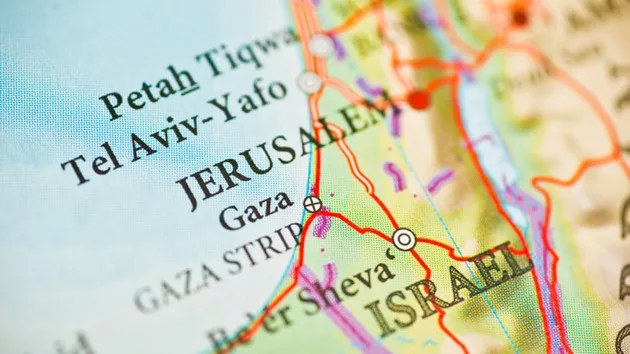
(WASHINGTON) — The U.S. military has begun to build the long-awaited port and causeway off the coast of Gaza that will establish a maritime corridor to bring humanitarian aid into Gaza, the Pentagon said Thursday.
“I can confirm that U.S. military vessels, to include the USNS Benavidez, have begun to construct the initial stages of the temporary pier and causeway at sea,” Maj. Gen. Pat Ryder, the Pentagon’s press secretary, told reporters, referring to the Joint Logistics Over-the-Shore, or JLOTS, system floating pier delivery system.
“We are aware of the significant interest in this important effort and will provide much more information in the very near future as we work alongside the international community to rush aid to the people of Gaza,” he added.
The Pentagon has estimated that, when operational, the pier would complement the existing land crossings for aid into Gaza and could provide as many as two million meals per day to Gaza.
Satellite photos taken by Planet Lab show construction work that has begun to be built in the land area where the causeway will be moored so trucks loaded with aid can get access inside Gaza.
Marine traffic websites show the USNS Roy Benavidez operating off the coast of Gaza, where it has begun the construction of the floating platform by which supplies will be offloaded from civilian cargo ships. The additional ships that will support the floating pier are en route to Gaza from Crete, Greece, where they had been docked after making a trans-Atlantic voyage to the eastern Mediterranean.
A senior U.S. military official who briefed reporters on Thursday said that the construction of the JLOTS landing platform began on Thursday several miles off the shore of Gaza.
“We are on track to begin delivery of humanitarian assistance to Gaza from the sea in early May,” said the official, who added that once operational the JLOTS pier will be able to handle about 90 trucks a day and then quickly build up to 150 trucks worth of humanitarian aid.
“This additional throughput from the sea represents a significant increase of life-saving aid,” the official said.
The plan is that humanitarian assistance from aid agencies will eventually make its way to the JLOTS platform and floating causeway after first being screened, palletized, and prepared for delivery in Cyprus, 200 miles away from Gaza.
The senior U.S. military official explained that the aid would then be unloaded at a floating platform located miles offshore. Then, there will be smaller watercraft each aboard carrying five trucks that will be offloaded onto the floating causeway or pier that will be anchored to the shore, the official said.
Those trucks will drop off their cargo in a secure area for future distribution and constantly repeat that process in a regular back and forth to the floating platform, the official said.
The truck drivers will not be U.S. military personnel or American contractors, the official said, but from an undisclosed country who are not Americans and who will have their own security.
Hundreds of U.S. soldiers and sailors who will build JLOTS and keep it operating will live and sleep aboard the British naval ship Cardigan Bay that will be located miles offshore, the official said.
The Biden administration has repeatedly said that there will be no U.S. “boots on the ground,” but that restriction does not apply to other personnel supporting the JLOTS mission who will be working in Israel.
With no U.S. forces on the ground to anchor the floating platform to the beach in Gaza, a U.S. Army engineering unit partnered with a similar IDF unit to train them on how to anchor it to the beach on “day one.” That training occurred on an Israeli beach “just up the coast,” said the senior military official.
In addition, U.S. military personnel will be working side-by-side with Israeli Defense Forces personnel at a coordination cell established at Hatzor airbase in Ashdod, Israel that is being run by a three-star U.S. general.
Another coordination cell, run by the U.S. Agency for International Development (USAID), has been established in Cyprus to organize the logistics of the flow of aid that will be delivered to Gaza through the maritime corridor.
Earlier on Thursday, a mortar attack in the general vicinity of where the pier will be located near Gaza City raised concerns about the security for the JLOTS mission that U.S. officials have long acknowledged will be provided by the Israeli military.
“It’s important also to highlight that this occurred before any U.S. forces have started moving anything,” said Ryder, who noted that “there is no U.S. equipment per se in this marshaling yard” that will be the future location of distributing aid offloaded via JLOTS.
The senior military official told reporters that the mortar attack has been assessed to have had nothing to do with the JLOTS mission and that security around the location struck will be “far more robust” when it is up and running.
“Force protection is our number one priority,” said the senior U.S. military official, who explained that Israel has committed a brigade of thousands of soldiers plus Israeli Navy ships and aircraft flying above that will protect American forces off-shore and the landing and distribution centers ashore.
The official said the U.S. military assesses that the security at the chosen location for the floating platform “is sufficient to support execution of the mission,” though any final decision will be left up to the commander of U.S. Central Command.
Copyright © 2024, ABC Audio. All rights reserved.




